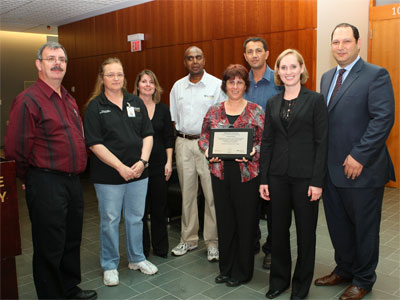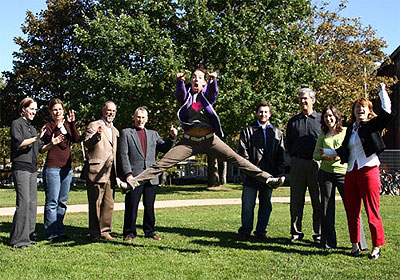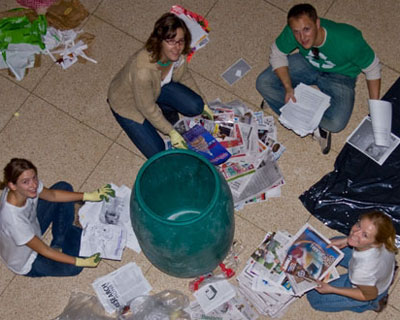 |
| HÂş» is presented with the EcoLogo Environmental Stewardship Award for its use of green cleaning products. In the photo are: Peter Gardiner, Heather Sallins, Juanita Haas, Ray Bundy, Joanne Marion, Marc Costandi, Melissa Peneycad of TerraChoice Environmental Marketing, and Paul Goldin with Avmor Ltd. (Nick Pearce Photo) |
HÂş» University has been recognized with two significant awards for its efforts to create a more sustainable, green campus.
One is the EcoLogo Environmental Stewardship Award. HÂş» is the first university to receive the award, which recognizes its switch earlier this year to green cleaning products.
Since January, HÂş» custodians have been using environmentally safe, biodegradable products manufactured by the Canadian company Avmor Ltd. These products, including an all-purpose cleaner, a disinfectant and a degreaser, replace more than 40 traditional cleaning products, many containing harmful chemicals detrimental to the environment and human health.
âThis is genuine environmental leadership,â said Melissa Peneycad of TerraChoice Environmental Marketing, the firm which administers Canadaâs EcoLogo program, at an award presentation in the Rowe Management Building on Wednesday.
The green cleaning products meet EcoLogoâs stringent environmental standards, containing no volatile compounds, phosphates or known carcinogens. Their use reduces the prevalence of asthma in the workplace and helps improve indoor health quality. They even save the university money because they have a higher dilution rate and last longer, added Ms. Peneycad.Â
 |
| Yay for Dal's Eco-Efficiency Centre. Joining in the celebrations are Penny Slight, Cynthia Waters, Ray Cote, Gerry Archibald, jumper Karen Connolly, Chris Keliher, Gerry MacDonnell, Emily Richardson and Michelle Adams. (Bruce Bottomley Photo) |
HÂş»âs other award, the Champion of Sustainability in Communities Award, is given by the Sustainable Endowments Institute, a special project of the Rockefeller Philanthropy Advisors in the U.S. that examines education and sustainability at campuses throughout North America.
The award singles out the work of HÂş»âs Eco-Efficiency Centre, a Faculty of Management-based extension service that engages large to small businesses in improving environmental and economic sustainability.
Michelle Adams, a HÂş» professor and interim director of the Eco-Efficiency Centre, says sheâs thrilled with the recognition for the centre.
âItâs greatly appreciated, especially considering where it comes fromâthis award isnât a local Halifax or Nova Scotia award, the group administering it is quite a bit broader.
âBut on the other hand, perhaps it's not that surprising given the work the centre does. People around the world are interested in our research. Just last week, for example, we had in an eight-member delegation from South Korea interested in our industrial networking.â
The Eco-Efficiency Centre, located on campus in the Rowe Management Building and in Burnside Industrial Park in Dartmouth, works with businesses to improve by suggesting ways to eliminate waste from processes and products, use natural resources more efficiently and avoid the creation of waste and pollution. Staff and students with the centre visit the businesses, examine their operations and identify ways to improve. The centre also holds a series of âlunch-and-learns,â discussing ways to save waste, energy and water.
âIt might be as simple as suggesting biodegradable cleaners to use instead of solvents, or water-soluble glues instead of formaldehyde-based glues,â says Prof. Adams. âOr did you know you could save energy with low-flow shower heads? It all seems pretty basic, but if you say, âhave you thought about this?â it makes people look at their businesses and their homes with new eyes.â
 |
| Students with Dal's Office of Sustainability work on an eco-audit in the Henry Hicks Building. Pictured here are Genna Woolston, Jessica Mitchell, Jon Hudson and Sara Perlmutter. (Bruce Bottomley Photo) |
But the same group which honored HÂş» with its Champion of Sustainability in Communities Award gave the university an overall grade of C+ on its âgreen report card.â
The Sustainable Endowments Institute lauded HÂş» for its administrative initiatives, such as setting up a sustainability office with a full-time director. The institute also gave the university high marks for its food service providerâs efforts to source food from local producers, recycling and composting efforts. But an F for âshareholder engagementâ dragged down the overall mark.
As Rochelle Owen, director of HÂş»âs Office of Sustainability, scanned the report card, she couldnât help but hum a few bars of that old song, Weâve Only Just Begun.
âItâs the first time weâve been graded in this way and weâre really just on our way.â She says the university is working to improve active transportation to and around campuses, upgrading buildings to save energy, and building sustainability initiatives into the master campus plan, which is now in the consultation phase. She notes the report card doesnât recognize efforts to incorporate environmental issues into the curriculum, âwhich I think we would do very well on.â
The College Sustainability Report Card is the only comparative evaluation of campus and endowment sustainability activities at 300 colleges and universities in North America. The profiles of 300 schools were created using information gathered through independent research and volunteer responses to surveys.
Among 17 Canadian universities surveyed, the University of British Columbia rated in the top 10, getting top marks for retrofits of nearly 300 buildings to increase energy and water efficiency and reduce emissions; for the student-run farm which provides dining services with seasonal produce; and for its transportation initiatives, including a campus shuttle, free transit passes, carpool programs and bike co-op with maintains 300 community bikes.
